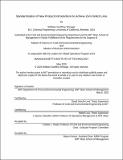Standardization of new product introductions to achieve zero defect lines
Author(s)
Winegar, William Geoffrey.
Download1191224748-MIT.pdf (1.641Mb)
Other Contributors
Sloan School of Management.
Massachusetts Institute of Technology. Department of Civil and Environmental Engineering.
Leaders for Global Operations Program.
Advisor
David Simchi-Levi and Retsef Levi.
Terms of use
Metadata
Show full item recordAbstract
Consistently high quality is important to any manufacturing environment, and especially so when operating in the highly regulated medical space, which typically targets zero defects in products serving patients. The New Product Introduction (NPI) process is a complex one, with many potential failure modes than can result in unanticipated costs, delays, and defective products. This project sought to streamline the NPI process through achieving three main objectives. First, NPI tools, processes, and checklists in current use were characterized. Second, insights for improving the NPI process were collected. Third, a new playbook was introduced to improve a specific aspect of the NPI process. Finally, recommendations were provided to direct future areas for potential improvement. While many of the tools in use were useful project management aids, recurring issues were identified, particularly at the front end of NPIs. A due diligence checklist was developed to structurally align the different parties involved with NPIs, facilitate communication, organize information, and increase the effectiveness of decision-making. This checklist was implemented using i- nexus, a software-based project management tool. This paper is focused on the manufacturing environment within Flex Inc.'s medical manufacturing division. However, this paper also discusses the relevance of checklists and other tools outside of this context. Project management environments in which these tools could improve quality, timeline, financial, and customer service outcomes are explored as potential areas for additional future work.
Description
Thesis: M.B.A., Massachusetts Institute of Technology, Sloan School of Management, in conjunction with the Leaders for Global Operations Program at MIT, May, 2020 Thesis: S.M., Massachusetts Institute of Technology, Department of Civil and Environmental Engineering, in conjunction with the Leaders for Global Operations Program at MIT, May, 2020 Cataloged from PDF version of thesis. Includes bibliographical references (pages 67-69).
Date issued
2020Department
Sloan School of Management; Massachusetts Institute of Technology. Department of Civil and Environmental Engineering; Leaders for Global Operations ProgramPublisher
Massachusetts Institute of Technology
Keywords
Sloan School of Management., Civil and Environmental Engineering., Leaders for Global Operations Program.